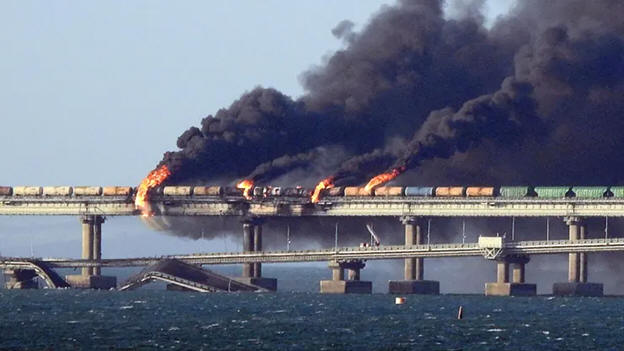www.aljazeerah.info
Opinion Editorials, October 2022
Archives
Mission & Name
Conflict Terminology
Editorials
Gaza Holocaust
Gulf War
Isdood
Islam
News
News Photos
Opinion Editorials
US Foreign Policy (Dr. El-Najjar's Articles)
www.aljazeerah.info
The Rising Tension in Russia-Ukraine War Warns of Bringing out the Prospect of Armageddon By Burhanettin Duran Sabah Daily, October 13, 2022 |
 |
 |
 |
|
Ukrainian civilians injured by Russian missile attacks, on October 10, 2022 |
Black smoke billows from a fire on the Kerch bridge that links Crimea to Russia, after a truck exploded, near Kerch, on October 8, 2022 |
The rising tension in Russia-Ukraine war
As the Turkish people focus on next year's elections, the Russia-Ukraine war has reached a new level. The Russian President, Vladimir Putin, is at a point of no return after having his country's parliament accept the annexation of four Ukrainian regions following the announcement of partial mobilization. In response, Volodymyr Zelenskyy, Ukraine's president, signed a decree by his country's National Security Council rejecting any negotiation with Putin. Moreover, with both sides doubling down, there is talk about the possibility of Russia using nuclear weapons. While Putin claims Russia has "more modern weapons than the NATO countries," U.S. President Joe Biden warned that the threat was credible by noting that it had not "faced the prospect of Armageddon" since President John F. Kennedy was mired in the Cuban missile crisis 60 years ago.
The nuclear showdown between Russia and the West deepened concerns around the world. What further escalated the tensions between Moscow and Kyiv, in turn, was the bombardment of the Kerch Bridge and, subsequently, Russian missiles targeting four Ukrainian cities, including the capital. It won't be surprising for the Kremlin to opt for a heavier bombardment of the Ukrainian cities if the situation further escalates. Meanwhile, speaking to reporters ahead of the Russian National Security Council meeting, Putin claimed that Ukraine was attempting to blow up the TurkStream pipeline. That is obviously a scenario that Türkiye, which has been relying on diplomacy since the war started, would absolutely not desire. It would be good for all parties to keep in mind that Turkey is the only country that has open channels with both Russia and Ukraine and that the continuation of those efforts is valuable.
The Kremlin's statement about a potential meeting of Russian and Ukrainian officials, with Türkiye hosting, lacked impact due to the annexation of Ukrainian lands. It is highly unlikely for Zelenskyy to return to diplomatic negotiations. After all, the Kremlin will insist on keeping a land corridor connecting Crimea with the four recently annexed regions. After successfully pushing the Russians to retreat from Kherson and Kharkiv and still receiving military support from the West, Ukraine is not likely to accept that plan at this time. The course of the war is already cyclical: Critical attacks, followed by retaliatory bombardment, followed by Western sanctions, followed by a heightened nuclear threat. Statements from the United States and the European Union signal that they hope to weaken Russia through a war of attrition. There is no shortage of nuclear threats, yet experts believe the United States is determined to avoid that course of action. As a matter of fact, the think tanks in Washington suggest that the U.S. would respond with conventional weapons even if Russia were to use tactical nuclear weapons. Still, there is no doubt that Moscow taking that step, which has represented a red line since World War II, would make the world a more uncertain and riskier place.
Meanwhile, Russia keeps doing everything in its power to ensure that the European economy suffers as much as possible this winter. The Organization of the Petroleum Exporting Countries (OPEC) decision to cut oil production by 2 million barrels a day, which it took despite pressure from the United States, also served Moscow's interests. The non-Western world remains committed to watching the clash between Russia and the West from the sidelines and putting its own interests first. That won't change unless and until the United States launches a comprehensive and effective campaign against Russia. However, that kind of ambitious campaign would create a much harsher political climate around the world. How the international community could manage that situation is another major question. Despite those negative developments, Türkiye should aim to ensure that diplomacy remains on the table as it already does. Indeed, the Ukraine war will be on President Recep Tayyip Erdoğan's agenda as he travels to Kazakhstan tomorrow. Over the next months, the Turkish leader will campaign for reelection and engage in exceptional leader-to-leader diplomacy to stop the fighting.
ABOUT THE AUTHOR
Burhanettin Duran is General Coordinator of SETA Foundation and a professor at Ibn Haldun University. He is also a member of Turkish Presidency Security and Foreign Policies Council.
The rising tension in Russia-Ukraine war | Column (dailysabah.com)
***
Share the link of this article with your facebook friends
|
|
|
|
||
|
||||||


